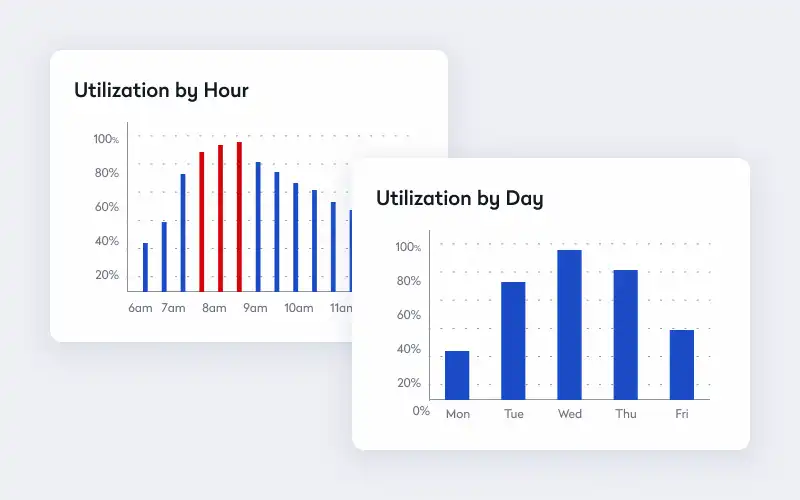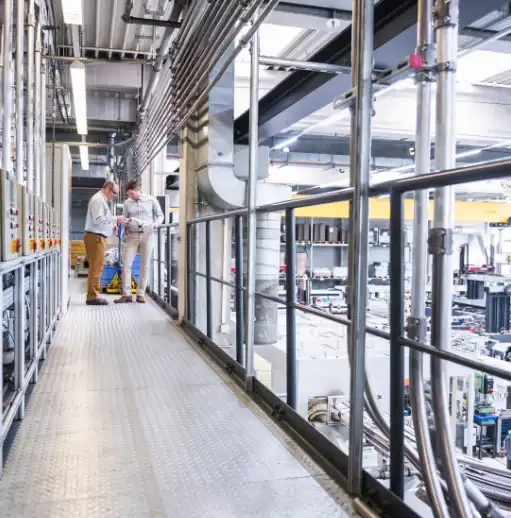
Large enterprises are already seeing increases in occupancy and utilization across their real estate portfolios. Proprietary data from 25 million global users reveal desk bookings have grown 33% annually, while visitor numbers have nearly doubled globally over the past three years, according to Eptura’s 2025 Workplace Index report. The demand is set to grow, with 34% of surveyed companies in the report planning to increase in-office days in 2025.
Looking at the day-to-day challenges of critical roles at large companies helps highlight the ways intelligent worktech can help enterprises support employee experience and maximize real estate investments.
Digital workplace leader: Balancing employee needs and the efficient use of space
As a digital workplace leader at a large company with multiple locations, Alex needs to find effective ways to manage uneven distribution of office attendance.
Her utilization dashboard, which automatically tracks attendance through badge swipes using a modern intelligent workplace solution, reveals a mid-week peak where most employees prefer to come in on Tuesdays, Wednesdays, and Thursdays, leading to a midweek mountain, maxed-out space utilization in the middle of the week while the office remains largely empty on Mondays and Fridays.
For teams, the midweek mountain can lead to a highly congested work environment, which can significantly affect productivity and morale. Overcrowded spaces can result in increased noise levels and distractions, making it difficult for employees to focus on their tasks. It can also lead to a higher frequency of informal and unproductive meetings, as team members struggle to find quiet areas to collaborate. Moreover, the uneven distribution of team members throughout the week can disrupt project timelines and decision-making processes. Key team members may not be present on the same days, leading to delays and inefficiencies in communication and task execution.
Office managers face the daunting task of managing resources and space during the midweek peak. The sudden influx of employees can strain the availability of essential resources such as meeting rooms, office supplies, and IT support. Ensuring all employees have access to the necessary tools and facilities becomes a logistical challenge, often leading to frustration. The midweek mountain can also complicate the scheduling of office events and training sessions, as finding a time that accommodates the majority of employees becomes increasingly difficult.
Smart software helps support good policies
By consulting with team leaders, she sets default office days for specific groups. The policy ensures teams can collaborate effectively while staggering attendance throughout the week. For example, setting default office days for different departments or project teams helps to distribute the workforce more evenly, reducing the mid-week peak and making the office environment more manageable. Alex can not only maximize space utilization but also enhance team dynamics and productivity by ensuring key team members are present on the same days, facilitating better communication and collaboration.

Alex also designates remote days and configures booking settings to prevent employees from coming into the office when it is already at capacity. She ensures the office remains a comfortable and productive space for those who are present. The policy helps to avoid the frustration and inefficiency that can arise from overcrowded offices, where finding a workspace or meeting room becomes a challenge. It also helps create a more flexible work culture, allowing employees to choose the days they work remotely, which can improve work-life balance and overall job satisfaction. The ability to configure these settings within the modern intelligent workplace solution provides Alex with the tools to make data-driven decisions, ensuring the workplace operates smoothly and efficiently.
Employee: Connecting with colleagues for better productivity
Ella, an employee based in Canada, is visiting her company’s headquarters in London for the week. One of the primary challenges is her unfamiliarity with the new office environment. Navigating a new city and office can be stressful, especially when it comes to finding the best transit options and understanding the layout of the office. Another significant challenge is maintaining productivity and connectivity, particularly with unexpected issues. Ensuring that she can seamlessly transition between remote and in-office work is crucial for her to meet her professional goals and contribute effectively to the team.
Seamless support, improved productivity
The addition of site information to her workplace solution provides her with the best local transit options, ensuring she can easily and efficiently get to the office. In the announcements section, she sees all the planned office activities, including the weekly happy hour, which are great opportunities for her to meet colleagues outside her immediate team, fostering a sense of community and collaboration.
Using intelligent booking, she books a desk near her team for Monday, Wednesday, and Thursday, the days she plans to be in the office, and a meeting room for Monday morning for seven people to discuss the week’s goals. When an unexpected issue arises, and she needs to relocate to the office for the day, she can use the intelligent booking feature to find the best available space, ensuring she can stay productive. As soon as she arrives, she swipes her badge and is automatically checked into her booked desk, streamlining the process and allowing her to focus on her tasks without any interruptions.
Global head of security: Protecting the premises with visitor management
Michael, the global head of security at a pharmaceutical company, faces many challenges when overseeing visitor processes across various international locations. One of the foremost concerns is ensuring data security policies are rigorously enforced and compliant with both local and international regulations. The company must manage visitor data with the highest level of confidentiality to protect sensitive client information and remain compliant with complex, comprehensive regulations.
Another significant challenge is the coordination and standardization of visitor management practices, which can be particularly complex due to the diverse time zones and cultural contexts of the company’s global offices. For example, implementing new visitor processes in the Singapore headquarters required meticulous planning and a pilot phase to ensure their effectiveness and security. Michael must also meticulously control access to highly sensitive areas within the buildings, including labs, to prevent unauthorized entry and potential security breaches. Balancing these responsibilities while maintaining a welcoming and efficient environment for visitors is a critical and multifaceted task that demands robust and adaptable security solutions.
Consistent security across the portfolio
A unified visitor management system has significantly improved Michael’s ability to address these challenges and maintain the security of the company’s facilities. The new global admin dashboard provides him with comprehensive visibility across all the organization’s locations, enabling real-time monitoring and management of visitor processes. Centralized control is essential for ensuring data security policies are uniformly applied. For example, Michael recently piloted shorter visitor data retention periods at the Utah headquarters. The positive outcomes of this pilot led him to implement these changes globally, and the dashboard facilitated the seamless application of these new settings to all office locations, preventing any local modifications that could compromise uniformity.
Enhanced visitor privacy controls are a crucial component of the system, allowing Michael to protect guests’ identities and meeting details from unauthorized personnel, which is particularly important at a pharmaceutical company.
By leveraging building-level access enhancements, he can restrict the visibility of these areas on company-wide floorplans. Only individuals who have been explicitly granted access can view and manage these spaces, thereby minimizing the risk of unauthorized entry and enhancing the overall security of the facility.
Intelligent worktech supports roles at every level of the enterprise
Organizations need a more connected, informed, and intelligent workplace ecosystem that can address key operational challenges, including leveling occupancy across the workweek to optimize spaces and enhancing employee productivity by automating desk and room booking.
At the Intelligent Workplace product event, Eptura Chief Executive Officer Brandon Holden outlined the many challenges large companies face at their commercial offices. “Enterprises are under pressure to manage rising office occupancy, deliver frictionless experiences, and make smarter decisions about their spaces and assets,” he said.
With insights and announcements from across the organization, Eptura showed how our updates will help industry professionals enhance workplace efficiency and security.
To learn more about the future of work, watch the event video on demand.









